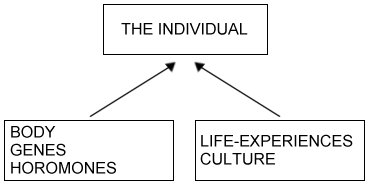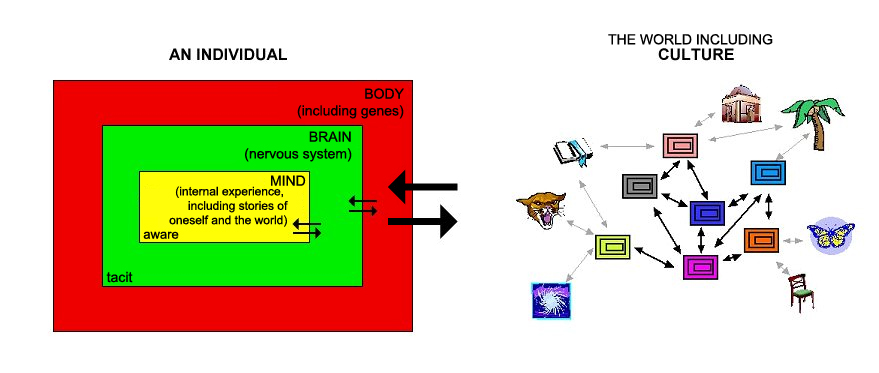Serendip is an independent site partnering with faculty at multiple colleges and universities around the world. Happy exploring!
Individuals and Culture
Individuals and Cultures
The relationship between cultures and individuals and the tensions that arise between the two is emerging as a focus of exploration in various contexts on Serendip. In progress below is a synthesis of materials that address and attempt to focus these issues. A starting point is the essay "Culture As Disability" that can be read either as a warning that cultures are necessarily antithetical to individual diversity, or as a challenge to develop new ways to think about both individuals and cultures that would reduce tensions between them. Also relevant to these issues is the role of diversity in biological systems and ways that biological systems achieve effective coordination among diverse elements. Perhaps biological systems can serve as a guide for the development of less disabling, or better, enabling cultures.
The figures below illustrate a contrast between a common way of thinking about the relation between individuals and cultures, and an alternative way that is further developed below. The figure to the left schematizes the individual as the joint product of things intrinsic to the body and of cultural forces. The figure to the right schematizes an alternate perspective in which the individual is both influenced by culture and is in addition an influence on it. In this latter way of thinking about individuals and cultures, individuals both affect and are influenced by cultures unconsciously as well as through conscious processes.
Your thoughts are welcome in the on-line forum area below.
 |
 |
Starting points
| "... Disabilities are less the property of persons than they are moments in a cultural focus. Everyone in any culture is subject to being labeled and disabled... A disability may be a better display board for the weaknesses of a cultural system than it is an account of real persons... This paper is not about disabled persons. It is about the powers of culture to disable..." |
| "... if we look around and try to describe life as we actually see it, its most obvious characteristic is not order. It is instead diversity... diversity is not only something to be tolerated but something to be encouraged..." |
| "...one finds humans more or less sorted into groups of similar people. Most readily noticed when the sorting occurs in terms of racial and ethnic features, there are all sorts of other ways that people also cluster in terms of similar characteristics. It is unlikely that there is a simple single cause for the sorting in any one case, much less that there is the same, single, simple cause for all of them. At the same time, it's curious that a similar phenomenon occurs in lots of different contexts, and one wonders whether there might be something similar that is contributing to all of them. An obvious possibility is that people have a preference for associating with people like themselves. One might well suspect that this would by itself lead to clustering, but the intuition is vague... Integrated populations much more easily result if one changes the character of the preference from a preference for similarity to a preference for difference." |
Brain variation
Is there such a things as a "broken" brain? An updated aproach to mental health "Difference, in these terms, is not "disability" but the potential for mutual empowerment, for gaining things by interaction with others that one might not be capable of alone and contributing things to others that enhance them in ways they could not have done by themselves. None of us are in fact capable of living independently of others, and that interdependence is an asset to our lives rather than a failing in them." Diversity and productivity "... all successful biological systems, ourselves included, are in fact systems that function well precisely because of the diversity of their components... "neurodiversity" is a function not simply of genes but of life experiences as well. And that neurodiversity is not only or even primarily a function of group differences, but is a property of individuals which may in turn contribute to group identities..." Brain and education "Perhaps what is needed in education (and in social/cultural institutions more generally?) is less concern for how to make individuals better than one another (as judged by some external standard) and more explicit attention to how individuals can both draw from and contribute to communities that maximize the potential of all individuals?" |
Senior Seminar in Neural and Behavorial Sciences |
Brain, Behavior, and Human Well Being
|
"The more I learn, the more I realize more and more "Clearly, people "on the spectrum" experience difficulties dealing with those who aren't. This, though, is a culture-specific "disability" rather than a generic one. It can be dealt with by people not "on the spectrum" altering their expectations of social interactions with people who are and, as Grandin urges, by making special efforts to teach people "on the spectrum" social "skills". What about, in addition, taking seriously the notion that people "on the spectrum" are not generically "disabled" but rather simply different?" |
A book review of
|
| "... The usefulness of a broader perspective relates not only to its ability to provide a common framework in which insights from diverse perspectives can be brought together but also to its ability to generate from that diversity new issues that deserve more general attention... we discuss some of the likely growing points that could emerge from [a] "biological/neurobiological/cultural" model of mental health, including the important questions of the potentials and limits of individual change and their relation to cultural change." |
Relationships between individuals and culture
| "Biology (like all science) doesn't answer questions (or solve problems) but it may (depending on one's degree of familiarity with it and other aspirations/ commitments) provide observations and perspectives that are novel and useful for developing improved stories about particular phenomena (including sex and gender?). As is the case with all story-generating systems, biology (and science) creates risks as well as benefits in this regard..." |
| "Suppose genes and experiences both affect behavior? Is that all there is to humanness, or is there something more... And if so, what? Must one fall back on spiritual or religious traditions to give us something more than our genes and our experiences, or is there something else that can be explored by empirical science?" |
| "The tension between the more local and the more global will not go away in culture at large or any part of it, but it can in principle be recognized for what it is: a continual and valuable mechanism for assuring not simply the testing of existing stories but the generation of new and productive stories as well. The key to doing so is to replace the concept of a hierarchy directed by a leader with, neither anarchy nor abject relativism, but rather with that of a multi-level interactive distributed system..." |
| "Here we bringing together materials that are relevant to thinking about the brain as the nodal point of the reciprocal relationships between individuals and cultures, a material entity whose interactions both produce social interactions and culture and which is in turn shaped in part by such interactions and their products." |
Book reviews from Serendip's Bookshelves
This quicksilver illness: Moods, Stigma, and Creativity - A review of An Unquiet Mind by Kay Redfield Jamison
Myth or Madness? Mania and the Artistic Genius - A review of Touched With Fire: Manic-Depressive Illness and the Artistic Temperament by Kay Redfield Jamison
T.M. Luhrmann's Of Two Minds: An Antrhopologist Looks at American Psychiatry
Christopher Wills' The Runaway Brain: The Evolution of Human Uniqueness
Antonio Damasio's Descartes' Error: Emotion, Reason, and the Human Brain
Anne Fadiman: The Spirit Catches You and You Fall Down: A Hmong Child, Her American Doctor, and the Collision of Two Cultures
More resources on Serendip and elsewhere
Measure for Measure: An Artistic Exploration of Eating Disorders, Body Image, and the Self
From The Inside
Exploring Mental Health
Making Sense of Diversity: Conversations at Bryn Mawr College
Institute for the Study of the Neurologically Typical
Science In Culture
The Evolution of Culture: trapped in two cultures with one future
11 Sept 2001: On Tribes and Individuals
Diverse Collectivity
Diversity: Cultural and Biological
Originally posted 12 Mar 2008 by Laura Cyckowski and Paul Grobstein.
- Login to post comments
-




Comments
Culture and the individual
Culture is an account of how our societies have been built over centuries for people to conduct their live and their tasks in harmony. Culture is a set of rules, protocols, patterns and customs with a degree of rigidity and each individual may find his own desires in contradiction with that structure. Invisible but as present as the physical world, culture is a force that needs to be understood first, before it can be enjoyed fully.